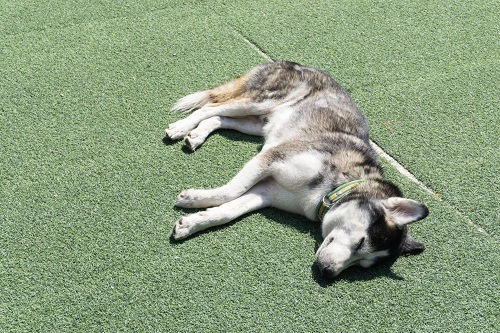Huskies are known for their energetic and adventurous nature, but like all dogs, they also need their rest. As a responsible pet owner, you may wonder what Huskies like to sleep on to ensure they get the best sleep possible.
Our goal in this article is to help you understand Husky sleeping habits and provide them with a cozy and comfortable sleeping environment.
Understanding Husky Sleeping Habits
Natural Sleeping Habits
Huskies are descendants of Arctic sled dogs, and their natural sleeping habits reflect their heritage. These dogs are used to long periods of rest in cold climates, which helps conserve energy for their active moments.
Recommended Hours of Sleep
On average, Huskies require around 12 to 14 hours of sleep per day. Puppies and older dogs may need more. Understanding their sleep needs is the first step in creating a suitable sleeping arrangement.
The Importance of Choosing the Right Bed
Selecting the right bed for your Husky is crucial to their overall well-being. Dogs, including Huskies, can suffer from joint issues and discomfort if they sleep on unsuitable surfaces.
Factors to Consider When Choosing a Bed
When choosing a bed for your Husky, consider the following factors:
Size and Breed Considerations
Ensure the bed is large enough for your Husky to stretch out comfortably. Take into account their breed and individual size variations.
Material and Durability
Opt for beds made from durable materials that can withstand Husky’s activity levels. Look for waterproof and easy-to-clean options.
Temperature and Climate
Consider your local climate when selecting a bed. Huskies are sensitive to temperature, so choose a bed that helps regulate their body heat.
Types of Beds That Huskies Prefer
Different types of beds suit Huskies’ needs and preferences:
Orthopedic Beds for Comfort
Orthopedic beds provide support for joints, making them ideal for Huskies, especially as they age.
Elevated Beds for Temperature Regulation
Elevated beds allow air circulation and help keep your Husky cool in warmer weather.
Soft and Cushioned Beds
Many Huskies prefer soft and cushioned beds that provide a sense of security and comfort.
DIY Bed Options for Your Husky
If you’re on a budget or enjoy DIY projects, consider making a bed for your Husky. An old mattress with a washable cover or a wooden pallet bed with a soft mattress can be excellent options.
Caring for Your Husky’s Bed
To ensure your Husky’s bed remains a comfortable sleeping spot, remember to:
- Regularly wash the bed cover.
- Remove hair and debris.
- Check for any signs of wear or damage and replace if necessary.
Ensuring a Comfortable Sleep Environment
Besides choosing the right bed, creating a conducive sleep environment is essential for your Husky’s well-being.
A Quiet and Peaceful Sleeping Area
Designate a quiet and peaceful sleeping area away from household noise and disruptions.
Darkness and Minimizing Disruptions
Huskies, like most dogs, prefer sleeping in darkness. Use blackout curtains if necessary and minimize disturbances during their sleep time.
Introducing Sleep Accessories for Huskies
In addition to a comfortable bed, consider introducing sleep accessories to enhance your Husky’s sleeping experience.
Blankets and Toys
Provide soft blankets and favorite toys to offer comfort and companionship.
Crate Training
Crate training can create a secure and cozy sleeping space for your Husky.
Training Your Husky to Sleep Comfortably
Establishing a bedtime routine can help your Husky develop good sleep habits. Regular exercise, feeding, and bathroom breaks at consistent times can signal that it’s time to rest.
Common Sleeping Issues and Solutions
Even the most well-cared-for Huskies can face sleep-related issues. Here are some common problems and their solutions:
Restlessness
If your Husky seems restless during the night, try increasing their daily exercise to tire them out before bedtime.
Excessive Barking
If your Husky barks excessively during sleep, consider crate training to provide a safe and secure sleeping space.

Monitoring Your Husky’s Sleep Patterns
It’s crucial to monitor your Husky’s sleep patterns regularly.
Importance of Observation
Keep an eye on their sleep habits to detect any changes or signs of discomfort.
Signs of Sleep-Related Health Issues
Be vigilant for signs of sleep-related health issues, such as sleep apnea or joint pain, and consult your veterinarian if you have concerns.
Conclusion
Finally, providing a comfortable sleeping environment for your Husky is essential for their health and well-being. Understanding their sleeping habits, choosing the right bed, and creating a peaceful sleep environment are key steps in ensuring your furry friend gets the quality rest they need.
FAQs (Frequently Asked Questions)
If your Husky doesn’t take to their bed, try making it more appealing with blankets or toys. Additionally, ensure the bed is in a quiet and comfortable location.
It’s a good practice to clean your Husky’s bed at least once a month, but more frequent cleaning may be necessary if your dog sheds a lot.
While it’s possible to use a human mattress, it’s best to choose a bed designed specifically for dogs. These beds often provide better support and are easier to maintain.
Allowing your Husky to sleep in your bed is a personal choice. However, it’s important to establish boundaries and consider potential disruptions to your own sleep.
Yes, changes in your Husky’s sleep patterns can be indicative of health issues. If you notice unusual sleeping habits or signs of discomfort, consult your veterinarian for advice.
